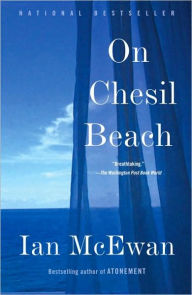On a July evening in 1962, a young newlywed couple sits down to dinner in their hotel suite on the Dorset coast. Bound by convention, they continue eating a meal they do not want, their attention drawn to the bed in the next room. Edward and Florence, both nervous, reflect on how their love for each other has brought them to this moment.
It may be hard for those born after the sexual revolution of the late 1960s and the availability of the Pill to understand the repression and gamesmanship of the time that came before. What little Florence has heard about sex disgusts her, but she is determined to do her duty. Edward has had only one experience, which did not go well, and has been kept at arm’s length by his beloved throughout their courtship.
McEwan expertly builds the picture of the time period and of these two—one a student of history and the other an apparently gifted violinist—who come from different levels of society. And yet, as I’ve found with other of McEwan’s novels, this story is mostly an intellectual pleasure.
I keep reading his novels because they are so well-constructed and so well-written. Individual sentences sparkle and delight. Yet there is something about McEwan’s novels that leaves me cold and unsatisfied.
Maybe it’s the sense that they are more an exercise than a story. The chessboard is laid out with care, each element with its purpose. The theme here is interesting: what we don’t say or do; society’s constraints versus how we feel. I find moments I recognize—ones I thought no one else knew—like the first thrill, dark and irresistible, of loosing the angry words suppressed in a lifetime of good behavior.
The plot is clear and cogent, from the usual McEwan beginning with a surprising event that changes everyone’s lives. What’s different here is that the book goes back instead of forward from that event. Only at the very end comes a quick summary of the resulting future. It is also different because it’s about what doesn’t happen. No stranger comes in and changes everything.
The characters are also well-constructed. I found Florence a little unrealistic, that she could be so completely frigid sexually and yet such a remarkable and passionate violinist. I wondered if perhaps there was some early trauma. McEwan drops a couple of hints of possible abuse, but—much as I appreciate subtlety and being left to figure things out by myself—it’s too little to make a case. I read an interview later where McEwan said that he left a few clues but didn’t want to make it explicit. I don’t think that is fair to the reader.
In the end, though, I don’t care about what happens to the characters. They seem like puppets being moved around. The story doesn’t engage my emotions. However, McEwan does bring back that time vividly. I found myself thinking of the 1961 film Splendor in the Grass, and how clearly I recall it after all these decades. This book, on the other hand, is fading quickly.
Have you read a novel that you appreciated, even admired, but didn’t enjoy?


Read it a few years ago—very disappointing. It also seemed unrealistic that everything could fall apart so quickly and so little effort made to move past it.
Yes, I agree. It’s another example of how the novel seems like puppets being moved around to make a point instead of telling a believable story.
He is an outstanding musician and a great violinist. Well done, Mr. Sorokow!